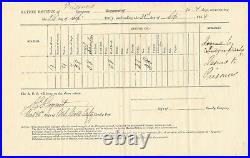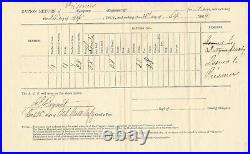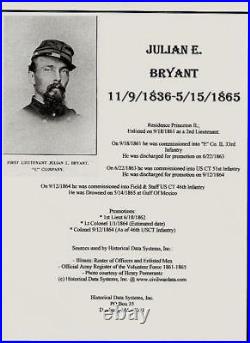Civil War Prisoner Ration Return Signed by Abolitionist For Colored Infantry





Was commissioned into E Co. IL 33rd Infantry, was discharged for promotion and commissioned into the US CT 1st Infantry on June 22, 1863.
Bryant was a nephew of abolitionist William Cullen Bryant, who served under Grant in the Vicksburg Campaign. Young Bryant's grandfather, Dr. Peter Bryant of Massachusetts, was a senator and a surgeon. At home, his servants ate at the same table with the family and were treated as equals.
Bryant believed that he was fighting for justice on the battlefield. He pursued the eradication of slavery with great intensity.Sterling Price maintained a secret rendezvous for new enlistees at Higginbotham Plantation. The Yankees camped nearby and discovered the secret outpost. Two Federal spies lurked in their midst, monitoring every move. One was Bryant, who struggled to impersonate a Rebel recruit. Both spies moved about comfortably and the unaware Rebels treated them very well as the spies conveyed important information to the Federal command.
One night Federal troops captured the plantation and gave arms to 20 slaves, who escorted their Rebel masters to Bryant's 33rd Illinois camp. This was the first instance in which slaves were liberated and armed.
In March 1862, the 33rd Illinois marched into Arkansas to Bayou Cache. On July 7, Bryant's unit, with fewer than 300 men, defeated a force of 3,000 Texas cavalry, killing 117 Confederates. In early 1863, Bryant was appointed to major of the newly organized 1st Mississippi Infantry, African Descent.His task was the discipline of black soldiers. The Confederates' hatred of black troops was surpassed only by their animosity toward the white officers who led them. Rumors ran rampant that officers were victims of atrocities, but Bryant not only survived the fighting and avoided capture but became conspicuous for his gallantry, constantly rallying his troops.
Bryant complained frequently that black troops, despite their bravery, were often given menial tasks. With Bryant's prodding, his uncle wrote a very strong editorial successfully pressuring one general to insist that commanders not force black officers to perform more than their share of menial tasks. Soon after, Congress passed a law that black soldiers be issued the same uniform, weapons, equipment, rations, pay and bounty as other soldiers.In February 1865, Bryant, 28, went to New Orleans and from there to garrison duty at Brownsville and Clarksville, Texas. Three days after arriving, Bryant drowned as he swam in the Gulf of Mexico. One page, 6 3/4" x 11", ration return issued for four prisoners for four days in September 1864, including pork shoulder, hard bread, coffee and sugar, boldly signed by Bryant for the U.
Our goal is please every customer. We are pleased to be members of The Manuscript Society, Universal Autograph Collectors Club and The Ephemera Society.